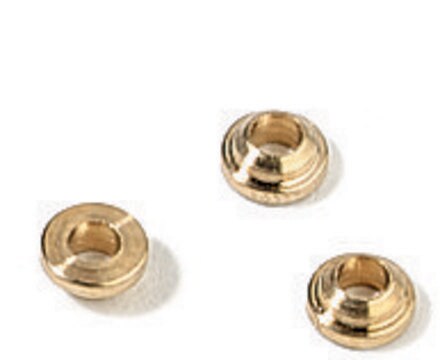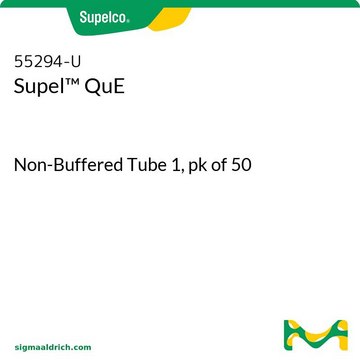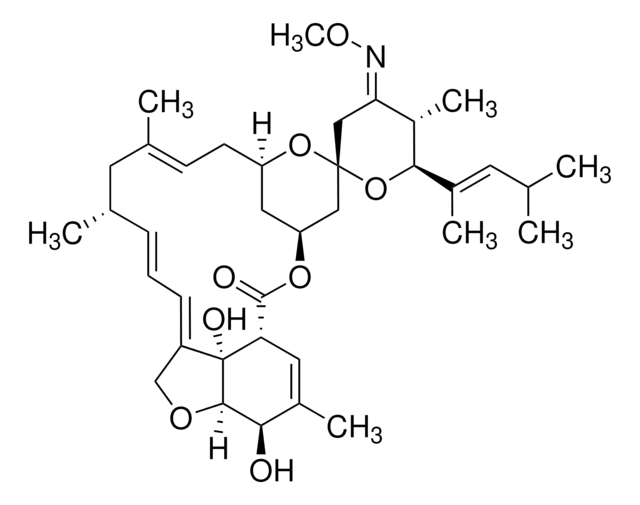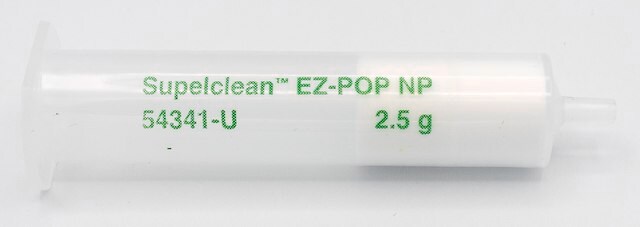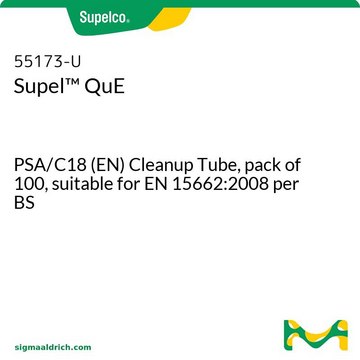Key Documents
55227-U
Supel™ QuE QuEChERS tube
Citrate Extraction Tube, pk of 50, suitable for EN 15662
Synonim(y):
QuEChERS
About This Item
Polecane produkty
product name
Supel™ QuE, Citrate Extraction Tube, pk of 50, suitable for EN 15662
Materiały
polypropylene tube
Poziom jakości
agency
suitable for EN 15662
linia produktu
Supel™
skład
magnesium sulfate, 4 g
sodium chloride, 1 g (Cat. No. S7653)
sodium citrate dibasic sesquihydrate, 0.5 g (Cat. No. 71635)
sodium citrate tribasic dihydrate, 1 g (Cat. No. S4641)
opakowanie
pk of 50
metody
QuEChERS: suitable
pojemność probówki reakcyjnej (do wirowania)
15 mL
Zastosowanie
food and beverages
metoda separacji
ion exchange
Szukasz podobnych produktów? Odwiedź Przewodnik dotyczący porównywania produktów
Opis ogólny
Using the QuEChERS method, food/agricultural samples are first extracted with an aqueous miscible solvent (e.g., acetonitrile) in the presence of high amounts of salts (e.g., sodium chloride and magnesium sulfate) and/or buffering agents (e.g. citrate) to induce liquid phase separation and stabilize acid and base labile pesticides, respectively. Upon shaking and centrifugation, an aliquot of the organic phase is subjected to further cleanup using SPE. Unlike traditional methods using SPE tubes, in dispersive SPE, cleanup is facilitated by mixing bulk amounts of SPE (e.g., Supelclean PSA, ENVI-Carb, and/or Discovery DSC-18) with the extract. After sample cleanup, the mixture is centrifuged and the resulting supernatant can either be analyzed directly or can be subjected to minor further treatment before analysis.
Supelco carries a line of vials and centrifuge tubes containing pre-determined amounts of salts and SPE sorbents to support the most common method configurations used today.
Zastosowanie
Przydatność
Informacje prawne
Zastosowanie
wymagane, ale niedostarczone
Kod klasy składowania
13 - Non Combustible Solids
Klasa zagrożenia wodnego (WGK)
WGK 1
Temperatura zapłonu (°F)
Not applicable
Temperatura zapłonu (°C)
Not applicable
Wybierz jedną z najnowszych wersji:
Masz już ten produkt?
Dokumenty związane z niedawno zakupionymi produktami zostały zamieszczone w Bibliotece dokumentów.
Klienci oglądali również te produkty
Produkty
Compared to conventional PSA/C18/GCB cleanup, cannabis extracts cleaned with the Supel QuE Verde mixture showed lower GC/MS background, and better recoveries for many pesticides.
The comparison of Supel™ QuE Z-Sep/C18, PSA/C18, and PSA QuEChERS sorbents, in terms of color removal and analyte recovery, is described for the cleanup of oranges prior to pesticide analysis.
Pistachios contain approximately 45% fat, which can result in a significant amount of coextracted matrix in the acetonitrile extract generated using the QuEChERS procedure. A zirconia based adsorbent significantly reduces coextracted matrix prior to LC-MS or GC-MS.
A procedure for cleanup of green tea extracts provides low background and allowed for the analysis of more pesticides at lower levels than QuEChERS. Uses less solvents and no toluene.
Protokoły
A highly selective and sensitive analytical method was developed for chloramphenicol using a QuEChERS type sample preparation approach and LC-MS/MS detection.
Powiązane treści
Metoda QuEChERS upraszcza oczyszczanie próbek do analizy pestycydów w próbkach żywności i rolniczych.
QuEChERS method simplifies sample cleanup for pesticides analysis in food and agricultural samples.
QuEChERS is a ‘Quick, Easy, Cheap, Effective, Rugged and Safe’ sample cleanup method used to prepare food and agricultural samples for pesticides analysis. QuEChERS is based on the Solid Phase Extraction (SPE) technique of sample preparation.
Chromatograms
application for HPLCapplication for HPLC, application for SPENasz zespół naukowców ma doświadczenie we wszystkich obszarach badań, w tym w naukach przyrodniczych, materiałoznawstwie, syntezie chemicznej, chromatografii, analityce i wielu innych dziedzinach.
Skontaktuj się z zespołem ds. pomocy technicznej


